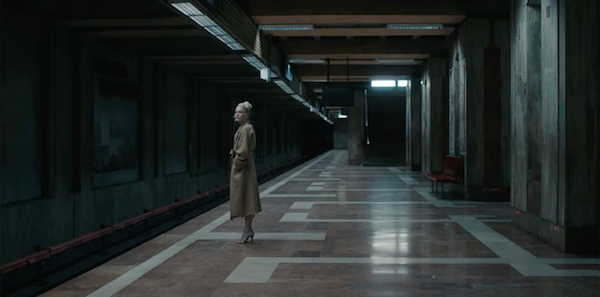Movie review by Greg Carlson
In Chloe Okuno’s feature debut “Watcher,” which premiered in the U.S. Dramatic Competition during the 2022 Sundance Film Festival, a frightening serial killer called the Spider haunts and stalks the neighborhoods of Bucharest. Maika Monroe’s aspiring actress Julia has unwittingly chosen this inopportune moment to relocate to Romania with her husband Francis (Karl Glusman), who has taken a new job to advance his career. While paying direct homage to “Rear Window” and several other sources, Okuno builds an effective thriller that draws the viewer into Julia’s increasingly hazardous disequilibrium.
Okuno, working from a screenplay by Zack Ford, makes excellent use of text and subtext to explore a range of ideas that unmistakably double as commentary on the commonplace experiences of women everywhere. For most, threats from diabolical murderers exist only in the realms of fiction, but the exhausting precautions women must take to safely navigate spaces private and public are underlined by Okuno’s choices. “Watcher” operates from within the genre framework of horror, and the casting of Monroe – most closely identified with her central performance in “It Follows” – makes an immediate thematic connection.
Busy with his gig and eager to impress his superiors, Francis immerses himself in work. An increasingly frustrated Julia spends long stretches of time alone. Adding to her feelings of isolation is the language barrier. Half-Romanian Francis speaks fluently and often communicates to others without bothering to fully translate for Julia, who neither speaks Romanian nor understands what is being said. Okuno uses this basic discourtesy as one of the first indicators that Julia cannot and should not depend on Francis. She also withholds subtitles to align non-speakers with Julia’s frustration.
Principal photography in Romania during the pandemic presented challenges to cast and crew. Okuno said in an interview for the virtual Sundance presentation that all-in, she spent six years getting “Watcher” made, so one can imagine that her commitment to the project was ironclad. And the film’s measured pace and carefully calibrated tone exhibit Okuno’s determination; the filmmaker maintains close contact with Julia’s point of view throughout the film. Perhaps Okuno’s most skillful feat as a storyteller is her ability to manipulate the viewer. For a time, we simultaneously question Julia’s sanity and empathize with her.
Some of Okuno’s cinematic inspirations are more obvious than others. The configuration of Julia’s new apartment, with a set of massive windows that look out directly into another building, establish a Hitchcockian baseline for the protagonist’s concerns. In one scene, Julia attends a screening of “Charade,” Stanley Donen’s own homage to the Master of Suspense. Others have noted allusions to titles as varied as “Halloween” and “Rosemary’s Baby,” and I would add “Repulsion” to the list. “Watcher” is more modest than these movies, but the comparisons indicate that we should do well to keep track of Okuno’s career.
It’s no spoiler to say that “Watcher” arrives at an intense climax that should startle even seasoned hounds. Okuno’s film is arguably grounded in a more realistic world than the one imagined by Alex Garland in “Men,” but a double-feature would reveal several intriguing ways in which the two movies are in concert regarding the extra work that women are called upon to do. When I reviewed “Men,” I quoted Taylor Antrim, who wrote about “the ubiquity of masculine power, about how male violence and thuggery are everywhere — and how ancient they are.” Antrim’s statement could just as easily be applied to “Watcher.”
